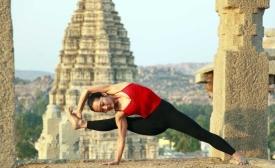narendra modi

Is India taking full advantage of yoga's soft power potential?
He presides over a one-party state that jails more journaliststhan any other on the planet, silences its critics ruthlessly and censors the Internet extensively. But China’s President Xi Jinping is not only wildly popular in his own country, he could be the most popular world leader globally.
The adoption of 21 June as the International Yoga Day by the United Nations signifies the support that recent diplomatic endeavours of the government have evoked on the world stage, External Affairs Minister Sushma Swaraj said on Monday.
During the recent Saarc summit, the Nepal Prime Minister's niece hosted the South Asian first ladies. A few days before that, Maggie Abbot, the Australia PM's wife took the wives of G20 leaders to see a wildlife sanctuary in Australia. And as a result, Indian babus in foreign relations are now missing the feminine touch to India's diplomatic endeavours and are hoping he will have someone fill in the post of First Lady for the country.
Before the Summit, Nepal was considered a country in transition, being involved in the peace process for so long and having recently emerged from conflict. But the success of the Saarc Summit has sent a message to the world that Nepal is capable of organising such a large summit effectively, efficiently and without any problems.
For a brief moment after Indian Prime Minister Narendra Modi’s election victory, there was optimism in both India and Pakistan. (...)Unfortunately, it has all been downhill since.
Since the election of Narendra Modi as India’s Prime Minister, New Delhi has appeared determined to create “Brand India” by harnessing its soft power resources. This was very much on display at the meeting Modi had with his Vietnamese counterpart Nguyen Tan Dung, during the latter’s visit to New Delhi late last month.
Many liberals in Nepal and India have long been concerned that the victory of Narendra Modi in the last general elections might undermine India’s secular foundations, “saffronise” India’s foreign policy, project the Hindutva agenda into Nepal and empower the much despised royalists in that country.







